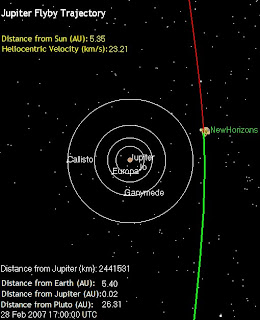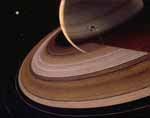In Our Time
If you're looking for a meaty podcast experience, I recommend In Our Time, a program from BBC Radio 4.
It's an hour-long program hosted by Melvyn Bragg, usually with three guests, that has enough time to delve pretty deeply into a variety of topics. One of the things that is most impressive is the unbelievably wide breadth of topics, some of which are quite interesting, others things you just haven't heard of before.
Recent episode subjects include:
- Bismark
- Anaesthetics - from ether frolics to pain-free surgery
- The Opium Wars
- St. Hilda
- The History of Optics
They also have a cool subject cloud.
(subscribe to podcast)
10 Principles of Economics
A hilarious explanation of Mankiw's 10 principles of economics. And here I thought I'd never apply the tags 'economics' and 'comedy' to the same post.
via Lifedev.net
The Social Dynamics of Binary Solar Systems
A recent study reports that binary-star planetary systems may be equally likely as single star systems to develop. As far as the geometry, the Space.com article three possibilities, based primarily on the distance separating the stellar pair. A close in pair might have a planetary system orbiting the center of gravity of the two stars, (giving you a Tatooine sunset). A pair with medium separation may be too unstable for planetary formation at all. And the third option is that the two stars may orbit far enough apart that they each have their own planetary systems in orbit around them.
It's this third option that I find most intriguing. Just as the Moon hangs tantalizingly close, in our sky, just asking to be flown to, imagine there was another entire solar system, a second sun 3-4 times the distance to pluto away. A good distance to be sure, but much more within reach than even Alpha Centauri. A tempting distance, especially if there were planets in it's habitable zone.
How much more eager would we be in that scenario to develop a real long-distance spaceflight capability? If there were colonies, the politics of the added distance would make it a much different dynamic than an outpost on Mars. Interesting stuff.
Labels: space
Verbal vs. Visual : One at a time please
However, it is noted that diagrams or images are still useful, it's just the practice of reading point form slides which is detrimental. I'd thus note that what they've really found is that bad presentation slides hinder retention, not slides in general.
via Slashdot
Labels: visualization
Is violence declining?
- The state's monopoly on violence and disinterested penalties for aggression eliminate the need for constant deterrence and vendettas on an individual basis.
- Violence is more common when life is perceived as cheap. As standards of living improve world wide, a higher value is placed on life.
- Non zero-sum games such as trade make others progressively more valuable alive than dead.
I'll be interested to see if his next book moves into topics beyond language.
via Arts & Letters Daily
Space Logistics
EOS had nothing to do with flying around arcade-like, and everything to do with constructing space stations from a variety of modules, dividing them between commercial and research output. I'm embarassed to say I spent hours with a calculator determining the optimum prices to set for the various products to match market movements. Eventually you could develop more advanced technology, and send spacecraft eerily reminiscent of Discovery from Arthur C. Clarke's 2001 to the different planets. As far as I could tell the end result seemed to be finding life on Europa, but that took hours of floppy disk swapping.
Project Space Station always seemed to end with having too little budgetary resources to maintain your space activities. This was frustrating, but ironically probably made it the most realistic of the two.
Powered by ScribeFire.
via Boing Boing
Labels: media, space, visualization
Posting from ScribeFire

Technorati Tags: admin
Powered by ScribeFire.
(The tags didn't take, as it turned out, and the I added the image manually after the fact.)
Labels: admin
Statistics Visualization
A fascinating presentation at TED from Hans Rosling, discussing demographic statistics with his visualization software. Really, you have to watch the video. If you don't have twenty minutes, the hightlight is here.
On a side note, apparently Dr. Rosling is also one of only five sword swallowers in Sweden.
Labels: visualization
Powerpoint: Octavian Proposes Emperorship
Slideshare is hosting a presentation competition, and this presentation of course caught my eye: A Roman Emperor, presented by Gaius Octavian Caesar
The Team
* Gaius Octavian Caesar, Emperor
Adopted son of a Dictator; vast experience in wielding absolute power over helpless individuals
* Gaius Octavian Caesar, Commander in Chief
Successful campaigns in Mutina and Pilippi; sleeps well in tents while others fight
* Gaius Octavian Caesar, High Priest
Previous experience in similar position; expert bribe-accepting skills
* Gaius Octavian Caesar, Treasury
Julii have always had money; no qualms about skimming off the top
Labels: history
Networking Tips
A couple good networking articles: How to Network for Introverts, and Networking for People Who Hate Networking. Nothing's more important to your career than building relationships.
via LifeHacker
Labels: gtd
World Map through Books

This is fascinating post on the Google Book Search blog, a Google employee did a world map mashup based on mentions of geographic locations in books, which he gleaned from Google Book Search.
There are also maps for different time periods which show the changing face of the world as expressed through published books. Cool Stuff.
via The Map Room
Labels: maps
New Horizons slingshots past Jupiter

New Horizons has received it's gravity assist from Jupiter and is on it's way to Pluto. I was surprised to see how far from Jupiter the probe actually passes. When you think of a gravity slingshot, it seems that the probe would be grazing the surface to get maximum acceleration, when in fact it's still outside the orbits of the Galilean satellites at closest approach.
New Horizons set a record for fastest transit time Earth-to-Jupiter of just over a year.
Labels: space
Interplanetary Internet
A couple years ago, IEEE Spectrum did an article on the Interplanetary Internet, a concept for extending the terrestrial internet into space, and specifically for communications with assets in orbit and on the surface of Mars.
During Columbia's final mission, the first IP file transfer between an orbiting shuttle and the ground took place. Typically the exact route of a transmission, such as which ground station is to be used, is determined a priori. This was the first time the packet found it's way into orbit on it's own.
At the time of that article, internet pioneer and co-creator of TCP/IP Vint Cerf was related to the JPL group that held that it would not be possible to extend TCP/IP beyond low earth orbit due to the lengthy time delays involved, favouring instead the creation of a 'delay-tolerant-networking' protocol.
It seems this effort is now known as the InterPlaNet protocol.
The Fermi Paradox
The Fermi Paradox can be defined thusly:
The size and age of the universe suggest that many technologically advanced extraterrestrial civilizations ought to exist. However, this belief seems logically inconsistent with the lack of observational evidence to support it. Either the initial assumption is incorrect and technologically advanced intelligent life is much rarer than believed, current observations are incomplete and human beings have not detected other civilizations yet, or search methodologies are flawed and incorrect indicators are being sought.(wikipedia).
The Space Review talks about a book on the paradox by Stephen Webb, where he delineates 50 possible solutions to the paradox, from autonomous alien weapons to the fact that we're alone.
There is also a new episode of the Universe Today podcast on the Fermi Paradox.
Labels: philosophy, space
Charting our health by the stars
Charting our health by the stars is a study conducted in Ontario to find correlations between Zodiacal signs and health, to illustrate how easy it can be for a study to produce false results.
Their conclusion:
“There is a danger in basing scientific decisions on the results of one study, particularly if the results were unanticipated or the association was one that we did not initially decide to examine,” says Austin. “But when several studies all arrive at similar conclusions, we reduce the risk of arriving at an incorrect outcome.”
I would note that most news stories about science are actually reports of one-time studies with surprising results. Is any wonder that the public can dismiss science as fickle 'first they said this, now they say that' flip-flopping given the nature of how it is reported. You're rarely going to see a breaking news flash that there is now large-scale scientific consensus on a particular topic. Instead, you're likely to hear that a single study shows Cocoa may improve brain blood flow, or something similarly biased towards small dietary changes saving your life. At least, when it isn't an out-and-out human interest story.
Zodiac study via Wired.
Space paintings by Don Davis

Don Davis is a space artist who did several works for NASA over his career. Happily, he's released them on to the public domain on his website since they were publicly funded.
Labels: space
New Blogger
Decided to give the new blogger a whirl, and looking to reinvigorate this thing. Perpetuating the theory that 40% of all blog posts are along the lines of "I'm going to start posting more."
Labels: admin
